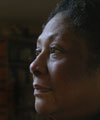TJ: Do you actually sit down to write a sonnet, ghazal, or villanelle? Or is it a more organic process related to the content?
MN: I sit down to write in a specific form.
TJ: Is there ever a thought, even a fleeting one, about where a poem you write ‘fits’ within the history of the forms you choose?
MN: No. Although if there is a history, I’m contributing to the recent part of it!
TJ: Do you find the structures of form liberating or constricting when you employ it for a poem?
MN: Liberating.
TJ: How often do you look outside English language poetic forms? Do you feel it to be a sort of vacation when you visit them, either when writing them or just reading them?
MN: Outside English Language forms? Is villanelle English or French? I can only imagine you must mean Asian forms? Haiku, etc? I’ve written a few, but they seem to require a special kind of attitude. I’ve tried to write ghazals which seem similarly unnatural to me.
TJ: Which contemporary poets do you envy? Exactly what do you envy?
MN: The ones who win $100,000 prizes.
TJ: Did you have a mentor when you began your writing career?
MN: I had an excellent editor in Stan Lindberg at Georgia Review.
TJ: What characteristic would you most like to emulate as you move forward?
MN: Being an acute reader.
TJ: What do you feel about the current state of the writing community?
MN: Dismay.
TJ: I put writers into two categories: writers who make me want to write and writers who make me want to throw up my hands and give up because they are just that amazing. Can you pick one writer for each category and can you explain the choice?
MN: The ones who make me want to write are the ones I feel I can do better than. Those who make me want to give up: Rilke, Szymborzka.
TJ: If you could go back in time and talk to your wide-eyed 10 year old self, what would you tell her about your choice of writing as a vocation?
MN: You don’t choose a vocation; it chooses you. Be brave.
Read Marilyn Nelson’s poems, “Daughters, 1990” and “Cachoiera“
Read more of TJ’s interviews in Women in Form
Marilyn Nelson, born in Cleveland, Ohio, is the daughter of a member of the last graduating class of Tuskegee Airmen. Her mother was a teacher. She is the author or translator of over twenty-four books. Marilyn’s latest collection of poems is Faster Than Light (2012), winner of the 2013 Milton Kessler Poetry Award. The Homeplace (1990) was a finalist for the National Book Award. The Fields of Praise: New and Selected Poems (1997) won the 1998 Poets’ Prize and was a finalist for the 1997 National Book Award, the PEN Winship Award, and the Lenore Marshall Prize. The Cachoiera Tales and Other Poems (2005) won the L.E. Phillabaum Award and was a finalist for the Los Angeles Times Book Award.
Her honors include two NEA creative writing fellowships, the 1990 Connecticut Arts Award, an A.C.L.S. Contemplative Practices Fellowship, the Department of the Army’s Commander’s Award for Public Service, a Fulbright Teaching Fellowship and a fellowship from the J.S. Guggenheim Memorial Foundation.
Marilyn was awarded the 2012 Frost Medal, the Poetry Society of America’s most prestigious award, for “distinguished lifetime achievement in poetry.” In January 2013 she was elected a Chancellor of The Academy of American Poets. Her latest collection for young adults is How I Discovered Poetry (Dial, 2014), a memoir in verse with illustrations by Hadley Hooper.

